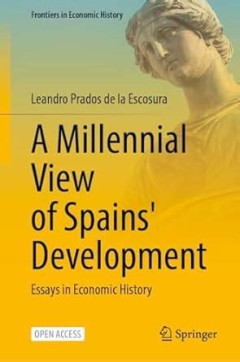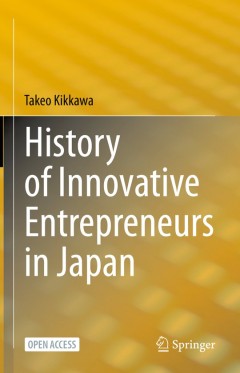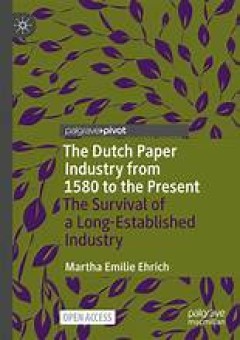Filter by

Ukraine's Journey to Recovery, Reform and Post-War Reconstruction = A Bluepri…
This open access volume explores Ukraine's challenges post-war, focusing on economic revival and sustainable development. Addressing scholars, policymakers, and practitioners the book discusses pivotal issues for the rebuilding of Ukraine, such as institutional changes, economic hurdles, social stability, and environmental rejuvenation. The book highlights the inevitable need for Ukraine's i…
- Edition
- -
- ISBN/ISSN
- 9783031664342
- Collation
- VIII, 315 hlm; ill., lamp.,
- Series Title
- -
- Call Number
- -

The Dutch Paper Industry from 1580 to the Present
This open access book is the first to provide an analysis of the Dutch paper industry over a period encompassing six centuries. Responding to a trend of renewed scholarly interest in paper industries and production, the book seeks to illuminate the factors behind this relatively small national industry’s centuries-long survival. Previous historical research has shown that sets of colonial,…
- Edition
- 1
- ISBN/ISSN
- 978-3-031-54324-1
- Collation
- oer.unej.ac.id
- Series Title
- Palgrave Studies in Economic History
- Call Number
- -

Economic Evaluation of Sustainable Development
This book is open access under a CC BY 4.0 license. This book presents methods to evaluate sustainable development using economic tools. The focus on sustainable development takes the reader beyond economic growth to encompass inclusion, environmental stewardship and good governance. Sustainable Development Goals (SDGs) provide a framework for outcomes. In illustrating the SDGs, the book emp…
- Edition
- 1
- ISBN/ISSN
- 9789811363894
- Collation
- XXIII, 145 ill; lamp
- Series Title
- -
- Call Number
- -

A Millennial View of Spain’s Development = Essays in Economic History
This open access book presents the evolution of the Spanish economy over the past seven centuries since the end of the Reconquest and examines how much economic progress has Spain achieved, as well as its impact on living standards and income distribution over the very long run. It shows that preindustrial Spain was far from stagnant, although levels of output per head in the early nineteenth c…
- Edition
- 1
- ISBN/ISSN
- 9783031607929
- Collation
- XXXII, 375 hlm; ill., lamp.,
- Series Title
- -
- Call Number
- -

History of Innovative Entrepreneurs in Japan
This is the first Open Access book introducing more than 20 of Japan’s leading innovative entrepreneurs from the 17th century to the present. The author outlines the innovative business models created by entrepreneurs including SoftBank’s Masayoshi Son, Fast Retailing (Uniqlo)’s Yanai Tadashi, Honda’s Soichiro Honda, Sony’s Akio Morita, Panasonic’s Konosuke Matsushita, and Toyota’…
- Edition
- 1
- ISBN/ISSN
- 978-981-19-9454-8
- Collation
- XIII, 291
- Series Title
- -
- Call Number
- -

The Dutch Paper Industry from 1580 to the Present
This open access book is the first to provide an analysis of the Dutch paper industry over a period encompassing six centuries. Responding to a trend of renewed scholarly interest in paper industries and production, the book seeks to illuminate the factors behind this relatively small national industry’s centuries-long survival.
- Edition
- 1
- ISBN/ISSN
- 978-3-031-54324-1
- Collation
- -
- Series Title
- -
- Call Number
- XIII, 149

Sustainable Energy Access for Communities
This open access book examines the transition to sustainable energy systems in emerging cities. Experts from around the world present case studies from different countries and discuss efforts were needed for achieving the United Nations Sustainable Development Goals (SDGs). The authors look into the issue of environment vs. economics and discuss the question of whether the energy transition goa…
- Edition
- 1
- ISBN/ISSN
- 978-3-030-68410-5
- Collation
- -
- Series Title
- -
- Call Number
- XXIV, 170

Rethinking Economic Growth Theory From a Biophysical Perspective
Neoclassical growth theory is the dominant perspective for explaining economic growth. At its core are four implicit assumptions: 1) economic output can become decoupled from energy consumption; 2) economic distribution is unrelated to growth; 3) large institutions are not important for growth; and 4) labor force structure is not important for growth. Drawing on a wide range of data from the ec…
- Edition
- -
- ISBN/ISSN
- 978-3-319-12826-9
- Collation
- -
- Series Title
- -
- Call Number
- -

EU Cohesion Policy Implementation - Evaluation Challenges and Opportunities
This open access book is the result of the 1st International Conference on Evaluating Challenges in the Implementation of EU Cohesion Policy (EvEUCoP 2022). It presents the recent findings, sparks discussion, and reveals new research paths addressing the use of novel methodologies and approaches to tackle the challenges and opportunities that are unveiled with the implementation of the EU cohes…
- Edition
- 1
- ISBN/ISSN
- 978-3-031-18161-0
- Collation
- -
- Series Title
- Springer Proceedings in Political Science and International Relations
- Call Number
- XII, 193

Rethinking Economic Growth Theory From a Biophysical Perspective
Neoclassical growth theory is the dominant perspective for explaining economic growth. At its core are four implicit assumptions: 1) economic output can become decoupled from energy consumption; 2) economic distribution is unrelated to growth; 3) large institutions are not important for growth; and 4) labor force structure is not important for growth. Drawing on a wide range of data from the ec…
- Edition
- -
- ISBN/ISSN
- 978-3-319-12826-9
- Collation
- -
- Series Title
- -
- Call Number
- -
 Computer Science, Information & General Works
Computer Science, Information & General Works  Philosophy & Psychology
Philosophy & Psychology  Religion
Religion  Social Sciences
Social Sciences  Language
Language  Pure Science
Pure Science  Applied Sciences
Applied Sciences  Art & Recreation
Art & Recreation  Literature
Literature  History & Geography
History & Geography